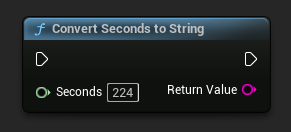Utilities
Convert seconds to string
This simple function can convert seconds (e.g., playback time) into either the hh:mm:ss or mm:ss format string, depending on the length.
- Blueprint
- C++

FString Seconds = URuntimeAudioUtilities::ConvertSecondsToString(224);